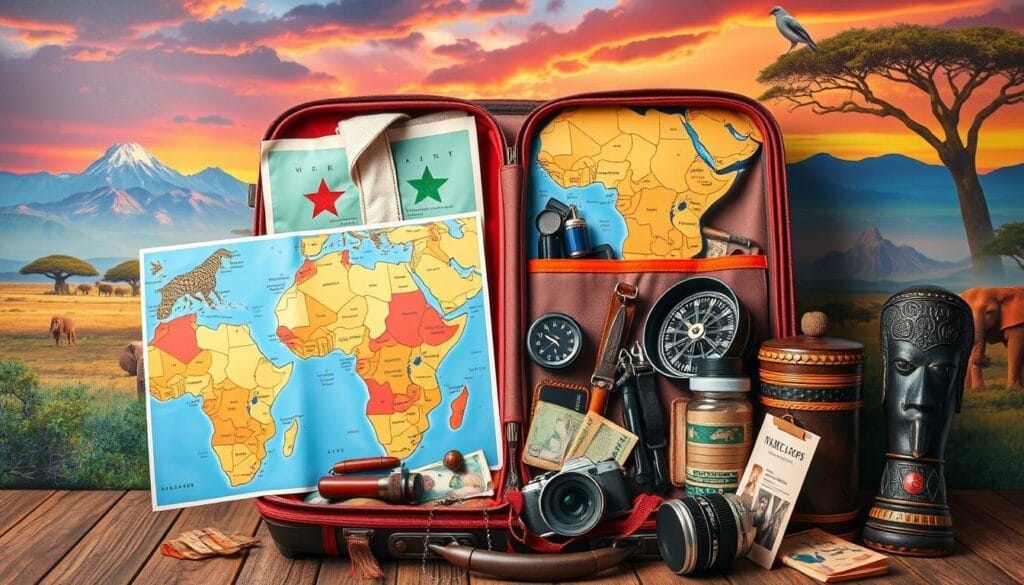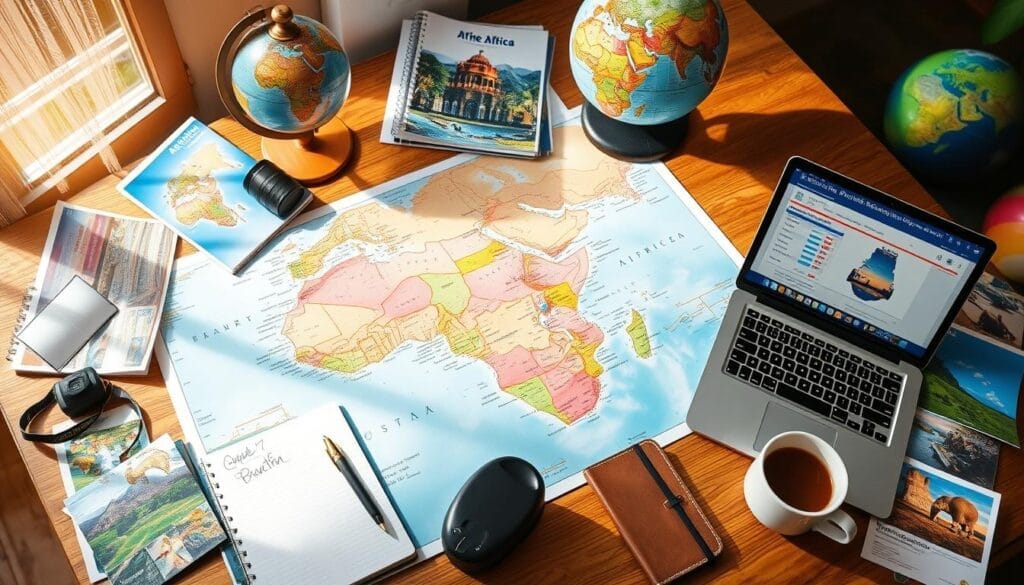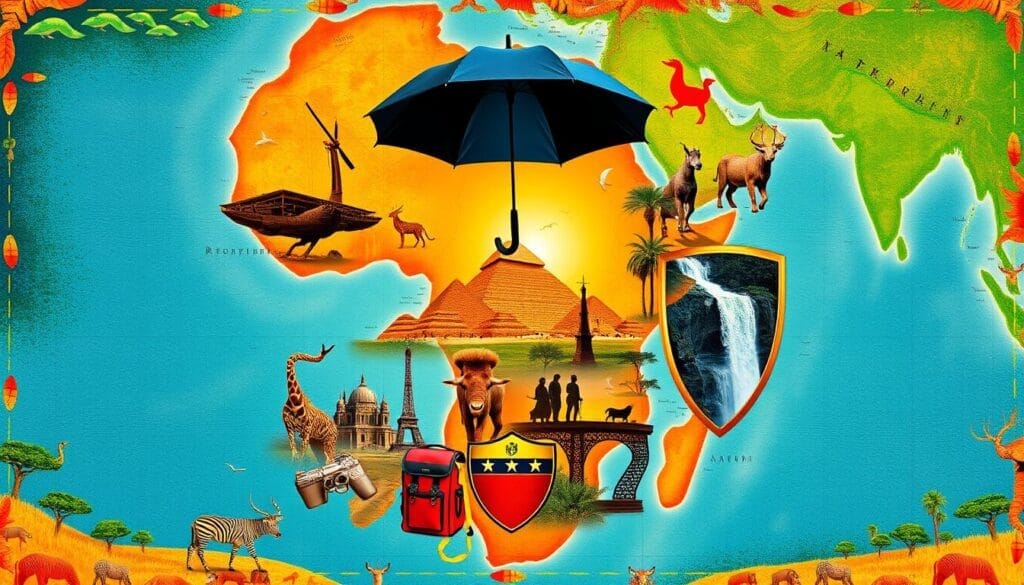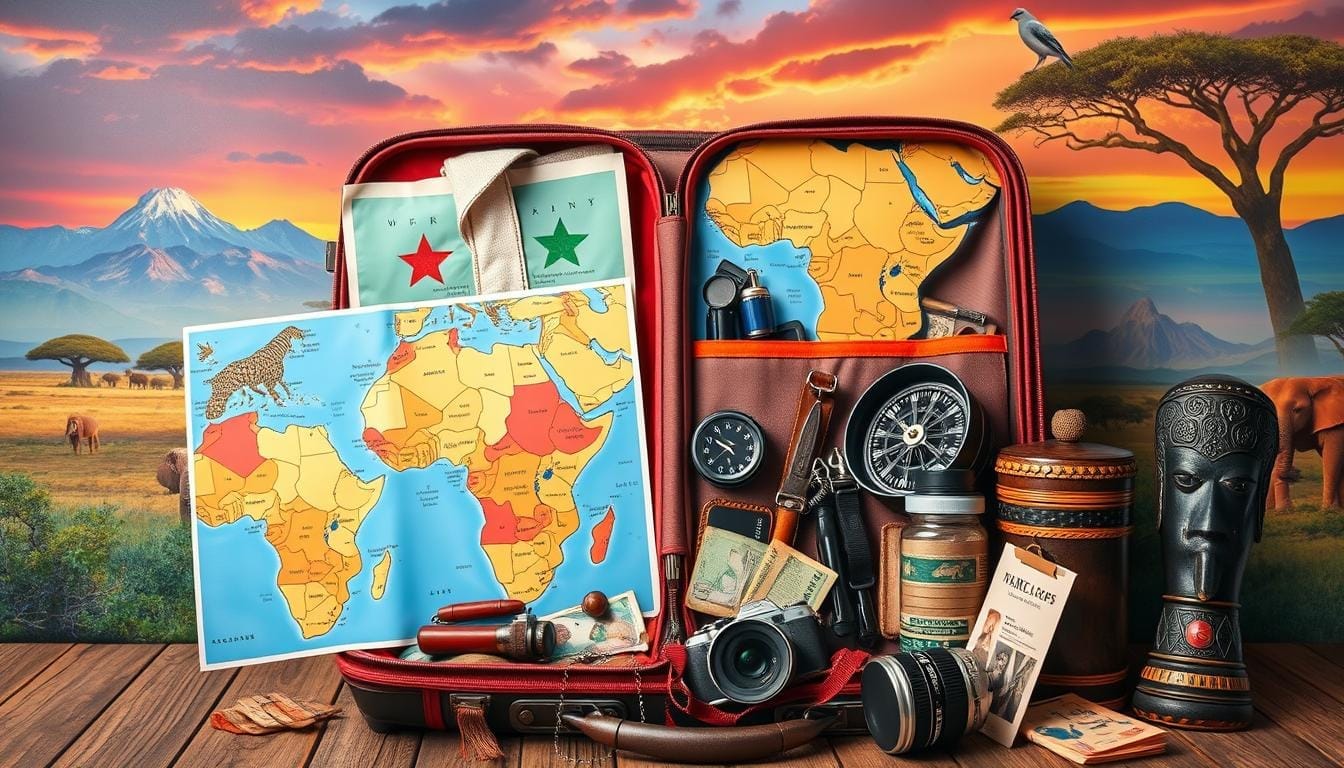Time-saving travel tips africa
Top 5 Time-Saving Tips You Need Before Traveling to Africa
Traveling to Africa can be an incredible and life-changing experience. It requires proper planning and preparation for a smooth journey. This article will give you the top 5 time-saving tips for your African adventure. From essential travel insurance to packing the right gear, these insights will help you make the most of your time-conscious africa explorations.

Whether you’re exploring Tanzania’s diverse landscapes or South Africa’s vibrant culture, these time-saving travel tips africa will make your journey memorable and efficient. Daily expenses in Tanzania average $71, while in South Africa, they can reach nearly $100.
Communication in Africa might be easier than you think, with over 700 million Africans speaking English. English is an official language in 24 African nations. Knowing about religion and vaccination requirements can also help you navigate the continent with savvy africa travel advice.
By using these efficient african travel strategies, you’ll optimize your itineraries. This way, you can fully immerse yourself in Africa’s wonders, maximizing your time on this remarkable continent.
Table of Contents
Why Time-Saving Tips Matter for African Travel
Planning an African trip needs careful thought to use your time wisely. Africa is huge, with 54 countries and many different landscapes, cultures, and ways of life. It can be tough for first-timers, but smart planning can help you enjoy your trip more.
The Challenges of Navigating a Vast and Diverse Continent
Africa’s size and variety make travel tricky. Traveling across the continent can be time-consuming, with long distances and different ways to get around. Also, some areas have limited infrastructure, so planning is key for a smooth trip.
How Proper Planning Enhances Your African Adventure
Good planning is essential to enjoy Africa fully. Knowing each area’s unique travel needs, expecting challenges, and making a smart itinerary lets you dive into Africa’s beauty. With time-saving tips, you can overcome africa travel challenges, optimize your africa travel planning, and maximize your time in diverse africa.

“Time is the most valuable asset when traveling in Africa. Proper planning can mean the difference between a rushed, frustrating experience and a well-paced, enriching adventure.”
Invest in Comprehensive Travel Insurance
Planning an African adventure means you should think about travel insurance. A good policy can save you a lot of money if something goes wrong. This is crucial for your africa travel.
Travel insurance for africa trips covers important things like medical costs and lost items. Without it, a small problem can turn into a big financial issue. So, always buy travel insurance before africa trips. Policies bought after booking might not cover as much.
When protecting your african adventure, look for a travel insurance plan with these features:
- Medical coverage: Make sure you’re covered for any medical emergencies or hospital stays.
- Trip cancellation and interruption: This can help you get back money for prepaid, non-refundable expenses if you have to cancel or cut your trip short.
- Lost or stolen belongings: Travel insurance can help you recover the cost of lost, stolen, or damaged items during your journey.
- Emergency evacuation: If you get seriously ill or injured, your policy should cover the cost of emergency transportation to a suitable medical facility.
Getting comprehensive africa travel insurance is a smart move. It gives you peace of mind and financial protection for your African adventure. Don’t travel without it!
“Travel insurance can literally save you tens of thousands or even hundreds of thousands of dollars in the event of an accident, illness, or emergency.”

Carry New US Dollar Bills for Visas and Expenses
Traveling to Africa means you’ll need fresh, new US dollar bills. Many countries there need USD for visas. Some even use the US dollar for everyday spending. Make sure to have large bills, no older than Series 2009, as smaller or older bills might not be accepted.
Importance of Recent Currency Denominations
It’s key to carry new US dollar bills when going to Africa. Older bills, even if in good shape, might not be accepted. This is because some places worry about fake bills and worn-out money. So, bringing bills from Series 2009 or newer ensures they won’t be a problem.
Using ATMs and Travel Cards in Africa
While cash is important, ATMs and travel cards can also help. ATMs, especially those in global networks like Visa or Mastercard, are safer and easier. Travel cards, like the N26 card, make shopping and getting cash easier without the need for lots of cash.
| Payment Method | Pros | Cons |
|---|---|---|
| US Dollar Bills |
|
|
| ATMs |
|
|
| Travel Cards |
|
|
Using a mix of new US dollar bills, ATMs, and travel cards helps manage your money in Africa. This way, you can enjoy your trip without worrying about money.
Pack an Unlocked Smartphone for Affordable Data
Africa has moved past its old tech image. The “Nokia revolution” has made mobile tech affordable and common. Bring an unlocked phone and get a local SIM card to save on data and stay in touch during your trip.
The Rise of Mobile Technology in Africa
Most places now have 4G networks. This means you can use apps, call, and even do business on WhatsApp. Mobile tech in Africa lets you stay updated, move around easily, and dive into local culture. With cheap data plans, you can keep in touch and enjoy your time here.
| Service Provider | Data Plan | Cost | Duration |
|---|---|---|---|
| AT&T International Day Pass | Unlimited Talk, Text, Data | $10 per day | Maximum 10 days per billing cycle |
| Verizon TravelPass | Unlimited Talk, Text, 2GB High-Speed Data | $10 per day | No cap on number of days charged |
| Airalo eSIM | 1GB to 20GB, Unlimited | Starting at $9.89 | 7 to 30 days, 1 to 15 days for unlimited |
These plans let you use your phone abroad without huge roaming fees. They’re a smart way to stay connected in Africa.
Whether you’re exploring, working remotely, or studying abroad, mobile tech in Africa makes your trip better. It keeps you connected, informed, and fully engaged with the culture.
Malaria Prevention: Essential Time-Saving Travel Tips Africa
Malaria is a big worry for travelers in Africa. But, with the right steps, you can stay safe and enjoy your trip. Knowing the malaria risks in your travel areas is key.
Understanding Malaria Risks in Different Regions
Malaria is a problem in many parts of Africa. But, some places have a lower risk. For example, cities like Johannesburg at high altitudes have fewer cases.
But, places like Kruger National Park, Limpopo, and Mpumalanga in South Africa are riskier. They need more careful prevention.
Prophylactic Medications and Insect Repellents
Talk to your doctor about taking Malarone (atovaquone-proguanil) or Doxycycline to fight malaria. Malarone is often chosen because it works well and has fewer side effects. Also, carry insect repellents with 20% or more DEET for outdoor use, especially at night.
Being proactive about malaria prevention lets you enjoy Africa without worry. Remember, no plan is perfect. If you get symptoms like fever or headache, see a doctor right away.
Don’t Forget Sunscreen for African Adventures
When planning your African adventure, don’t forget to pack sunscreen. Sunburns can ruin your trip. So, a good sun protection product is key for your travels across Africa.
Finding sunscreen in Africa can be tough. The local people often don’t need it. To keep your skin safe, bring your own sunscreen from home. This way, you’ll have a reliable product against the intense African sun.
Choose a sunscreen with a high SPF and broad-spectrum coverage. It should also be water-resistant and sweat-proof. Remember to pack essential gear for Africa like a hat, sunglasses, and long-sleeved clothes. These will help protect your skin from the sun.
By packing sunscreen and other sun protection items, you can enjoy Africa’s wonders without sun worries. With the right sun protection for Africa travel, you’ll make unforgettable memories.
Stay Healthy with Probiotics: Travel Tips for Avoiding Stomach Issues
Traveling to Africa is an amazing adventure, but it can bring traveler’s diarrhea. This is often due to different water quality. Luckily, probiotics can help.
Research shows that a good probiotic supplement can lower stomach problem risks. Saccharomyces boulardii, Lactobacillus rhamnosus, and Bifidobacterium animalis subsp. lactis BB-12 are top choices for this.
Probiotics boost your gut health, helping your body adjust to new places. They keep digestive problems away, so you can enjoy your trip. For the best protection, take at least 1 billion CFUs of probiotics daily.
“Probiotics help restore the natural balance of gut bacteria disrupted by factors like antibiotic use or gastrointestinal infections.”
There are more ways to stay healthy in Africa. Keep a regular sleep and meal schedule, drink plenty of water, and avoid bad food and water. These steps help ensure a great trip.
By focusing on your digestive health with probiotics and other steps, you’ll make unforgettable memories. Keeping your stomach happy is key to a great African adventure.
Dress Down to Blend In and Respect Local Cultures
Traveling to Africa means being aware of local customs and dressing right. Don’t wear flashy or expensive clothes. They might attract thieves or scams. Choose conservative and modest outfits to blend in.
Avoiding Unwanted Attention as a Visitor
About 70% of African and Asian countries want tourists to dress modestly. This means long pants and covered shoulders. Dressing down shows respect and keeps you safe from unwanted attention.
Locals in less visited places might be shy around outsiders. Dressing modestly helps you connect better with them. This makes your trip to Africa more enjoyable and comfortable.
- Avoid wearing expensive or flashy clothing and accessories
- Opt for conservative and modest attire that helps you blend in
- Respect local dress codes and cultural norms to avoid drawing unwanted attention
Dressing right and respecting local cultures makes your African journey smoother. You’ll also build good relationships with the people you meet.
“Demonstrating open-mindedness, respect for local customs, and promoting sustainability during travel can help build positive relationships with the communities visited.”
| Region | Traditional Attire |
|---|---|
| Middle East | Long, flowing garments such as abayas |
| Europe | Casual but elegant clothing |
| Southeast Asia | Loose-fitting clothing made from light and breathable fabrics |
| West Africa | Bold and colorful traditional clothing, such as boubous and kaftans |
| East Africa | Distinctive red shukas worn by Maasai warriors |
Respecting local cultures and dressing right lets you blend in as a visitor in Africa and avoid unwanted attention. This makes your trip more enjoyable and respectful.
Pack Essential Gear: Headlamps, Power Banks, and More
Getting ready for your African trip means packing the right gear. You’ll face power outages and limited infrastructure. So, bring a reliable headlamp and a good power bank to keep your devices charged.
A headlamp is key for exploring dark places or when the power goes out. It lets you move around without worrying about light. A power bank is also crucial for keeping your phone, camera, or other gadgets charged.
Don’t forget other travel gear for Africa like a portable water filter, a tough backpack, and a multi-tool. With the right essential gear for Africa travel, you’ll tackle challenges easily. This way, you can enjoy your African adventure to the fullest.
| Essential Gear for Africa Travel | Reasons to Pack Them |
|---|---|
| Headlamp | Allows for hands-free lighting in areas with limited infrastructure and power outages |
| Power Bank | Keeps your devices charged and ready to use during your packing for Africa trips |
| Portable Water Filter | Ensures access to clean, safe drinking water while preparing for power outages in Africa |
| Durable Backpack | Allows you to comfortably carry all your must-have items for Africa during your travels |
| Versatile Multi-Tool | Provides a range of functions to address various needs that may arise during your Africa travel |
Packing the right essential gear for Africa travel prepares you for the continent’s unique challenges. You’ll be ready to make unforgettable memories on your African adventure.
Avoid Packing White Clothing to Minimize Laundry Hassles
When you’re packing for your African trip, don’t forget this important tip. Avoid white clothes because they can quickly get dirty on Africa’s dusty roads. Darker colors hide dirt better, making your packing easier.
Africa’s climate can also damage your clothes. White items are more prone to stains and wear. Choosing darker clothes means less laundry and more fun on your trip.
By picking the right clothes, you’ll stay comfortable and stress-free. Explore Africa’s beauty without worrying about your clothes.
“The best way to explore Africa is to pack light and focus on durable, versatile clothing that can withstand the elements.”
Respect Local Customs: Time-Saving Travel Tips Africa for Photography
Africa is a dream for photographers with its diverse landscapes and rich cultures. But, it’s key to respect local customs and etiquette. Always ask for permission before taking photos. Many Africans might feel offended or ask for money if they see you taking their picture without asking.
Be careful with religious and cultural sensitivities. Don’t take photos in places where it’s not allowed, like churches or sacred sites. Showing respect for these customs not only shows you value the culture. It also helps avoid trouble or misunderstandings during your trip.
To have a smooth and ethical photography experience in Africa, follow these tips:
- Learn about photography etiquette in the places you’ll visit.
- Approach locals with respect and ask for their permission before taking their photo.
- Know about cultural and religious sensitivities and avoid taking photos in restricted areas.
- Stay away from photo scams where people ask for money for being photographed.
- Use the chance to learn about the local culture and connect with the community.
By following these guidelines, you can make beautiful photos while respecting the people and places in Africa. Your careful approach will make your trip better and help protect the continent’s rich culture.
| Photography Etiquette in Africa | Respecting Local Customs | Avoiding Photo Scams |
|---|---|---|
| Always ask for permission before taking photos of individuals or communities. | Be aware of cultural and religious sensitivities, and avoid capturing images in restricted areas. | Refuse to pay for photographs and report any suspicious requests to local authorities. |
| Familiarize yourself with regional photography guidelines and customs. | Engage with the local community to learn about their traditions and practices. | Avoid taking photos of children without parental consent, as this can be considered exploitative. |
| Respect the privacy and personal space of the people you encounter. | Consider donating or supporting local initiatives that preserve cultural heritage. | Be cautious of individuals who approach you offering to take your photograph for a fee. |
By practicing ethical photography and respecting local customs in Africa, you can truly capture the continent’s essence. Your thoughtful actions will not only make your trip better. They will also positively impact the communities you visit.
Embrace Flexibility: The Essence of “Africa Time”
Traveling in Africa means learning to love “Africa Time.” It’s all about taking it easy with schedules and timelines. Visitors from the West might find it hard to adjust at first. Buses leave when they’re full, and food orders take longer than expected.
Instead of getting upset, try to adapt to Africa time. Embrace flexibility in African travel. And manage expectations when dealing with delays in Africa.
By embracing a slower pace in Africa, you can reduce stress. You’ll also get to know the unique rhythms of the continent better. Add extra time to your plans to handle the unpredictable nature of “Africa Time.”
This flexibility lets you adapt to Africa time and enjoy the journey more. You won’t be always rushing around.
“In Africa, time is not money – it is life itself. The sooner you learn to appreciate this, the more you’ll enjoy your travels.”
Flexibility is key to a great African adventure. Be open to the unexpected and let “Africa Time” set your pace. This way, you’ll make unforgettable memories and truly experience Africa’s beauty.
Conclusion: Maximizing Your African Adventure with Time-Saving Strategies
Traveling to Africa can change your life, but it needs careful planning. With the right tips, you can navigate Africa’s diverse lands smoothly. You’ll stay healthy, safe, and enjoy all the wonders Africa has to offer.
Start by getting travel insurance and packing smart. Learn to adapt to “Africa Time” for a better trip. Booking with a local tour operator in places like Tanzania makes your journey easy and worry-free.
African tourism is booming, with 150 million visitors expected by 2030. Stay informed and ready for your trip. With these tips, you’ll have a memorable and efficient journey. So, get ready for an adventure of a lifetime with confidence.
